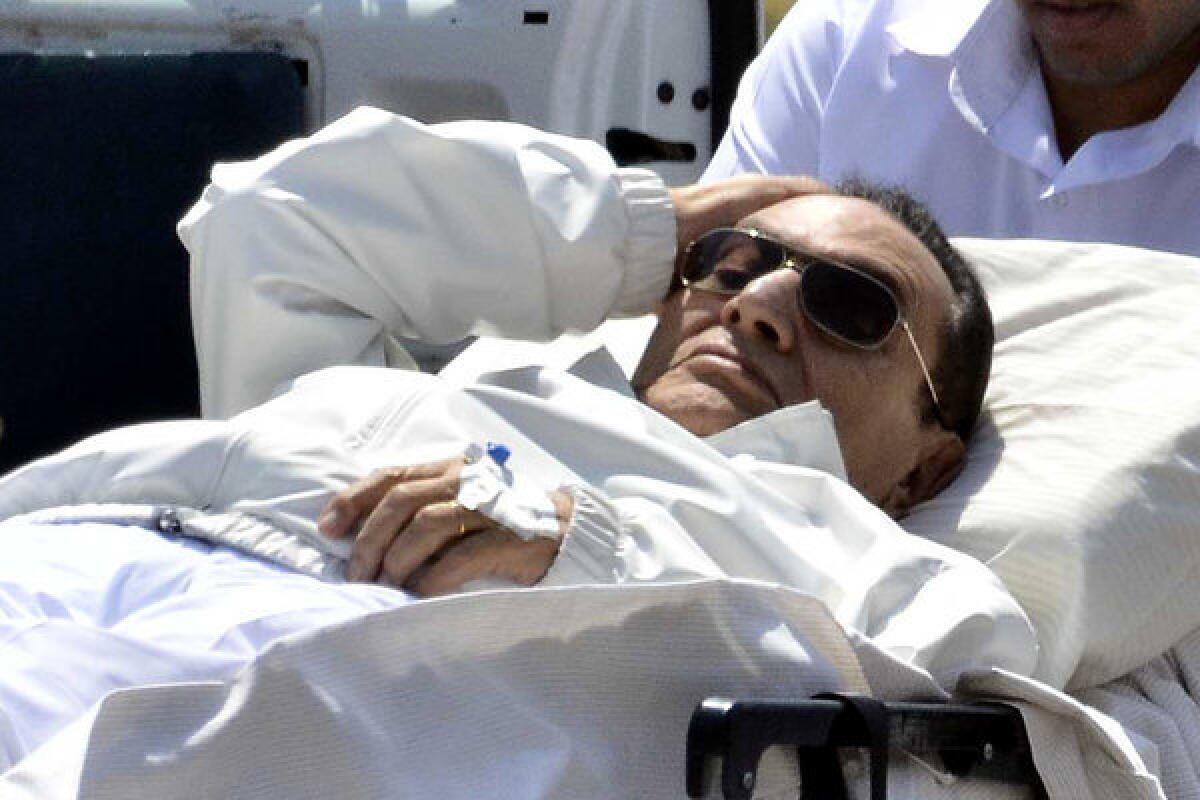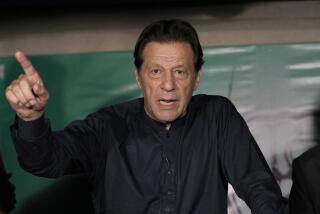The Week Ahead: Iran and Pakistan on the stump, Mubarak on trial

D-Day for Iranian presidential race
Tuesday, May 7 -- So many candidates, so few promising real change.
More than a dozen Iranian lawmakers, former Cabinet ministers, revolutionary guardsmen and allies of Islamic leaders have thrown in their hats for the race to replace President Mahmoud Ahmadinejad. And with Tuesdayâs deadline for declaring candidacies fast approaching, some of the more popular figures are still on the sidelines.
Ahmadinejad canât run again because of Iranâs two-consecutive-term limit, but he is widely seen as backing a top aide, Esfandiar Rahim Mashaei. Mashaei is disliked, though, in both secular and clerical circles, and his expected bid may well be nixed by the Guardian Council, a hard-line panel close to supreme leader Ayatollah Ali Khamenei with the power to decide who can and cannot run.
The near certainty of rejection by the council may explain why no one advocating sweeping reform of the Islamic government has come forward from the remnants of the âgreen movementâ that was crushed after the 2009 vote that reelected Ahmadinejad.
Former Presidents Ali Akbar Hashemi Rafsanjani and Mohammad Khatami are popular and regarded as inclined toward modest reforms. Neither has expressed much enthusiasm to run amid Iranâs sanctions-strangled economy and international isolation. If neither comes forward by Tuesday to claim a place on the June 14 ballot, Stanford-educated engineer and academic Mohammed Reza Aref is expected to declare and embrace their desires for better relations with the West.
Among those who have announced their candidacy are former Foreign Minister Ali Akbar Velayati, who is close to the supreme leader; former chief nuclear negotiator Hassan Rouhani, a Rafsanjani ally; and Mohsen Rezai, a conservative who was among those defeated by Ahmadinejad in 2009.
Tehranâs hard-line mayor, Mohammed Baqer Qalibaf, is also expected to enter the race.
Brazil challenging Asian giants for clout in Africa
Wednesday-Friday, May 8-10 -- Brazilâs investment and aid to developing African nations will be a topic of key interest at the World Economic Forum on Africa in Cape Town, South Africa, when the South American economic powerhouse is expected to unveil plans for financing construction of a vital drinking-water reservoir in Mozambique.
The Moamba Major dam project to supply water to the Mozambique capital, Maputo, is projected to cost $500 million, the Chatham House think tank in Britain estimates.
Brazilâs trade with Africa has soared from $4.2 billion to $27.6 billion in the last decade, the think tank reports, an investment in what the Brazilian government hopes will evolve into an important export market for its products.
Brazilâs approach to developing ties with Africa, in particular with countries that share the Portuguese language, has been more broadly based than the resource-focused trade pursued by China and India, writes John Campbell, the sub-Saharan Africa specialist with the Council on Foreign Relations.
The Bank of Brazil is expected to conclude the Moamba Major deal in the near future, the daily newspaper Noticias reported last month.
The aims of this yearâs forum, according to its organizers, are accelerating economic diversification, boosting strategic infrastructure and unlocking Africaâs talent.
Death and democracy compete on the Pakistani campaign trail
Saturday, May 11 -- Pakistanâs bloodsport of politics concludes its current season with a general election Saturday expected to demonstrate that at least some elements of democracy have taken hold in the restive country.
At least 40 deaths and 120 injuries inflicted on the campaign trail are blamed on the Taliban, whose threats to terrorize secular parties have put a damper on public rallies.
Regardless of the outcome, the vote will represent a political maturity landmark for Pakistan: The new government will be the first to replace an elected leadership that managed to serve out its full mandate.
The ruling Pakistan Peopleâs Party concludes an unimpressive five years at the helm, with its most notable accomplishment being that it avoided ouster. And that, analysts say, is thanks largely to the candidate seen as front-runner, former Prime Minister Nawaz Sharif and his Pakistan Muslim League faction. Breaking with political tradition, Sharif counseled those impatient with his bloc and President Asif Ali Zardari to let votersâ choices run their course.
Rule of law also gained traction with a Pakistani courtâs decision last week barring former President Pervez Musharraf from seeking political office again. Musharraf, whose 1999 coup cut short Sharifâs earlier prime ministerial stint, returned from four years of self-imposed exile in March with hopes of staging a political comeback.
One potential spoiler for Sharifâs return to power is the candidacy of charismatic cricket star Imran Khan, wildly popular with younger Pakistanis whom he has roused with calls to clean up the countryâs legendary corruption. The one political faction not threatened by the Taliban, Khan and his Pakistan Tehreek-e-Insaf party have been able to draw large and enthusiastic crowds to public events without fear of attack.
Mubarak in the dock, again, for retrial on protestersâ deaths
Saturday, May 11 -- The suspended retrial of ousted Egyptian leader Hosni Mubarak is expected to resume, once again probing his alleged complicity in the deaths of nearly 900 protesters during the âArab Springâ uprising that drove him from power.
Mubarak, now 85, was convicted in June 2011 for his role in the killings attributed to his security forces and vigilante supporters. He was given a life sentence, but an appeals court in January struck down the conviction and punishment and ordered a new trial. The conviction and sentence of his former interior minister, Habib Adli, also were vacated.
Mubarakâs lawyers sought to secure his release pending the new proceedings but were thwarted by the imposition of fresh charges alleging corruption -- accusations that were rejected in his first trial a year ago.
Some who suffered under Mubarakâs authoritarian rule welcome a second chance for prosecutors to argue that he deserves the death penalty for ordering, condoning or ignoring the brutality that marked his 30 years in power. Others, though, fear that a judiciary still riddled with Mubarak appointees might issue a softer verdict, perhaps even acquittal.
President Mohamed Morsiâs Muslim Brotherhood supporters have criticized the judiciary for several recent acquittals of influential figures from the Mubarak regime.
On April 13, Judge Mustafa Hassan Abdullah delayed Mubarakâs retrial when he withdrew from the case the day it was to start, saying that he felt âuneaseâ presiding over the matter. Mubarak opponents had sought the removal of Abdullah after he acquitted 25 of the ex-dictatorâs loyalists of charges they attacked protesters in a mounted raid atop camels and horses.
More to Read
Sign up for Essential California
The most important California stories and recommendations in your inbox every morning.
You may occasionally receive promotional content from the Los Angeles Times.











